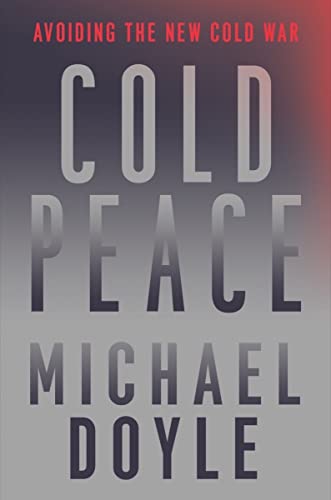Cold Peace: Avoiding the New Cold War

Would you prefer a cold peace to a cold war or hot war? This book outlines a series of policy compromises to manage and perhaps reduce tensions between the United States and Russia over Ukraine and with China over Taiwan. Michael Doyle, a political scientist at Columbia University, knows all the problems and dangers. Still, he suggests scenarios that might help the most powerful actors on the world stage avoid unnecessary catastrophes and devote more resources to truly urgent problems such as income inequality and climate change,
The first two-thirds of the book review how the world got to the present juncture. These chapters provide an expert’s readable summary that will enlighten most readers apart from professional historians. Except for readers already familiar with 1930s Italy and Japan, however, Doyle’s chapters on how those cases resemble and differ from those of Xi’s China and Putin’s Russia will enlarge the horizons of most political scholars.
Doyle reminds us how U.S. diplomacy succeeded in negotiating arms controls with the Kremlin and normalizing relations with China in the midst of cold war conflicts. Could similar achievements take place in today’s conditions?
Climate change is a serious security challenge for all actors large and small, one that should push their attention to what really counts, but will it? Nearly half of U.S. politicians do not take climate challenges seriously. Are politicians in China and Russia more enlightened?
Is a compromise peace available for Ukraine—perhaps one that leaves Crimea and Donbas statelets as parts of the Russian Federation? Or one that leaves Ukraine unattached to NATO or the EU? Anxious to show some gains for his efforts, Putin might go for such a deal. If he needs to show larger achievements, these crumbs may not suffice. For Kyiv, giving any reward to Putin is unthinkable, Also, it is unlikely that Russia would pay any reparations unless Putin is replaced.
How to square the circle on Taiwan and the Taiwan Straits? Doyle suggests deals where Beijing allows for some kinds of navigation in the Taiwan Straits and Washington agrees to some limits on its military presence there. But we are left with the contradiction: Washington agrees there is only “one China” but also pledges to defend Taiwan from aggression. Having seen what has happened to Hong Kong, few Taiwanese are ready to accept any form of union with mainland China.
Doyle lays out another peril not directly associated with territory—cyber war. Every country, large and small, is vulnerable. Each wants protection for its electronic infrastructure, its air waves, and elections. Some kind of cyber arms control could benefit most players. For now, however, each player is testing how far it can go without provoking outright war. There is no cyber equivalent to “mutual assured destruction.” If some kind of mutual restraint is agreed, how could it be enforced except by retaliation—a sure road to chaos?
Acutely aware of all such complexities, Doyle calls for a caucus of democracies and for strengthening U.S. democracy. The unity of free world democracies has proved fairly firm with regard to Russia and Ukraine. Still, their unity is fragile. Some give far more aid to Ukraine than others. President Emmanuel Macron keeps looking for ways to end the war at Ukraine’s expense. He also leads a few other European actors determined to do business with China no matter its threats to Taiwan or its genocidal treatment of Uyghurs and other minorities.
Doyle’s ultimate resort is the American body politic, but this looks like a weak hand. The political culture of the United States is sick with few signs of hope on the horizon. Americans managed to elect a decent and farsighted president, but even he is unable to regulate the spread and use of firearms. He cannot silence Fox News and other purveyors of false information that polarize the country. He cannot yet alter the composition of a Supreme Court, some of whose members have failed every test of personal morality and lack a capacity for unbiased reflection on the issues before the court.